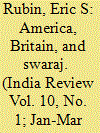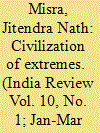| Srl | Item |
| 1 |
ID:
103767


|
|
|
|
|
| Publication |
2011.
|
| Summary/Abstract |
In the years before and during the Second World War, the Roosevelt Administration played an important and often overlooked role in encouraging Britain's disengagement from the Indian subcontinent. Roosevelt's motivations in pressing for Indian independence were varied. They included a mix of principled opposition to colonialism, practical concern for the outcome of the war and pragmatic jockeying for influence with post-colonial nations when the war was won. Churchill's government was wary of being pushed by Washington to move more quickly to "quit India" than it thought prudent. U.S. policy and actions clearly influenced the direction of events toward independence, but U.S. caution as the war ground on led to disillusionment among nationalist leaders. This reaction would have consequences once swaraj was won and India came into its own, at a time when the Cold War was becoming the dominant factor in America's view of the world.
|
|
|
|
|
|
|
|
|
|
|
|
|
|
|
|
| 2 |
ID:
103768


|
|
|
|
|
| Publication |
2011.
|
| Summary/Abstract |
This essay makes a comparative assessment of two works dealing with contemporary India. Gupta explains why India has not taken off despite its impressive growth. Nilekani examines the ideas that have shaped the debate about India's development. The essay argues that Nilekani is more optimistic about India's future than Gupta. Gupta's book is a major work that will stand the test of time. Nilekani's book is novel in that he is an entrepreneur who became an author. These are contrasting works. Gupta asserts that growth in India has not led to development. Nilekani argues that India's growth has become more broad-based. Gupta says that the statistics behind India's success hide its underlying failures. Nilekani considers growth to have become more broad-based. Nilekani's moral vision is concerned with ideas, Gupta's is with people. The essay concludes that Indians may be too optimistic about their achievements, but India also has successes to show.
|
|
|
|
|
|
|
|
|
|
|
|
|
|
|
|
| 3 |
ID:
103766


|
|
|
|
|
| Publication |
2011.
|
| Summary/Abstract |
The article examines why some ethnic groups seeking ethno-political autonomy engage in violence while others respond with relative quiescence. It compares and contrasts the ethno-political movements of the Bodos and Misings in northeast India and adopts an integrated approach in which the mobilizing structure and state responses assume equal and important roles that determine the correlation between the mobilizing process and levels of contention. A fundamental claim is that popular support and participation are crucial to shape the trajectories and strategies of ethnic movements. What determines the level of popular following is long-term commitment, legitimacy, and effective communicative strategies adopted by activist organizations. This in turn, generates collective mobilization and produces mechanisms for violence. The absence thereof leads to less disruptive contention. Further, the level of ethnic contention is determined by consistency and extent of ethnic accommodation and the nature of state repression. Consistent accommodation can have a countervailing effect on the activists to launch violent rebellion. Accommodation may range from implementing particular ethno-linguistic policies to selective incentives or cooptation of core political activists by the government. Contrarily, inconsistent accommodation and widespread state repression leads to high levels of violence.
|
|
|
|
|
|
|
|
|
|
|
|
|
|
|
|